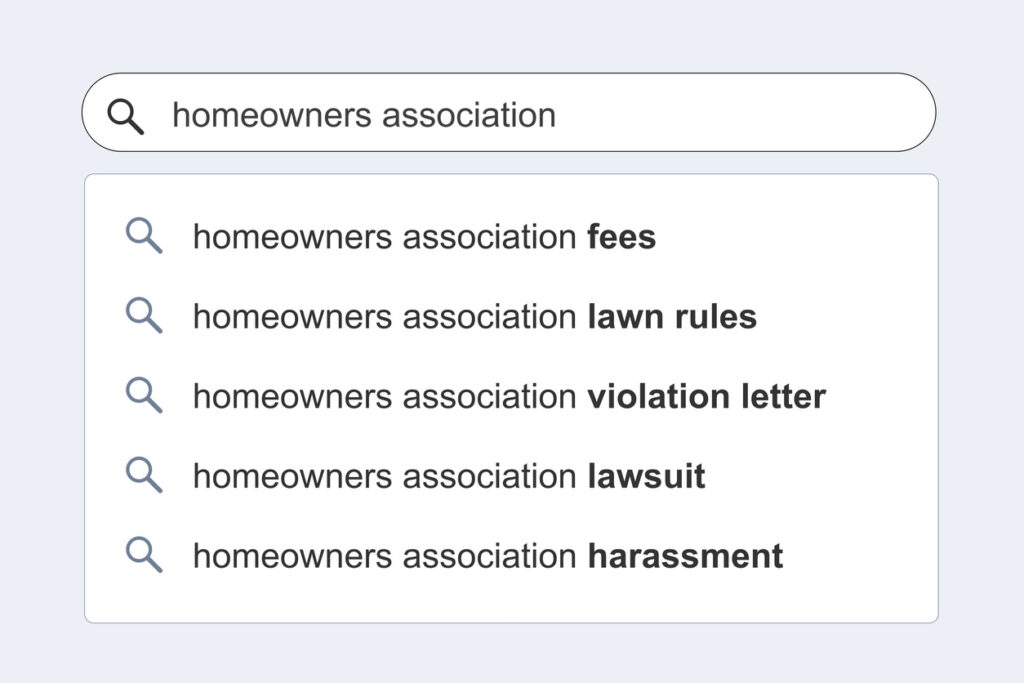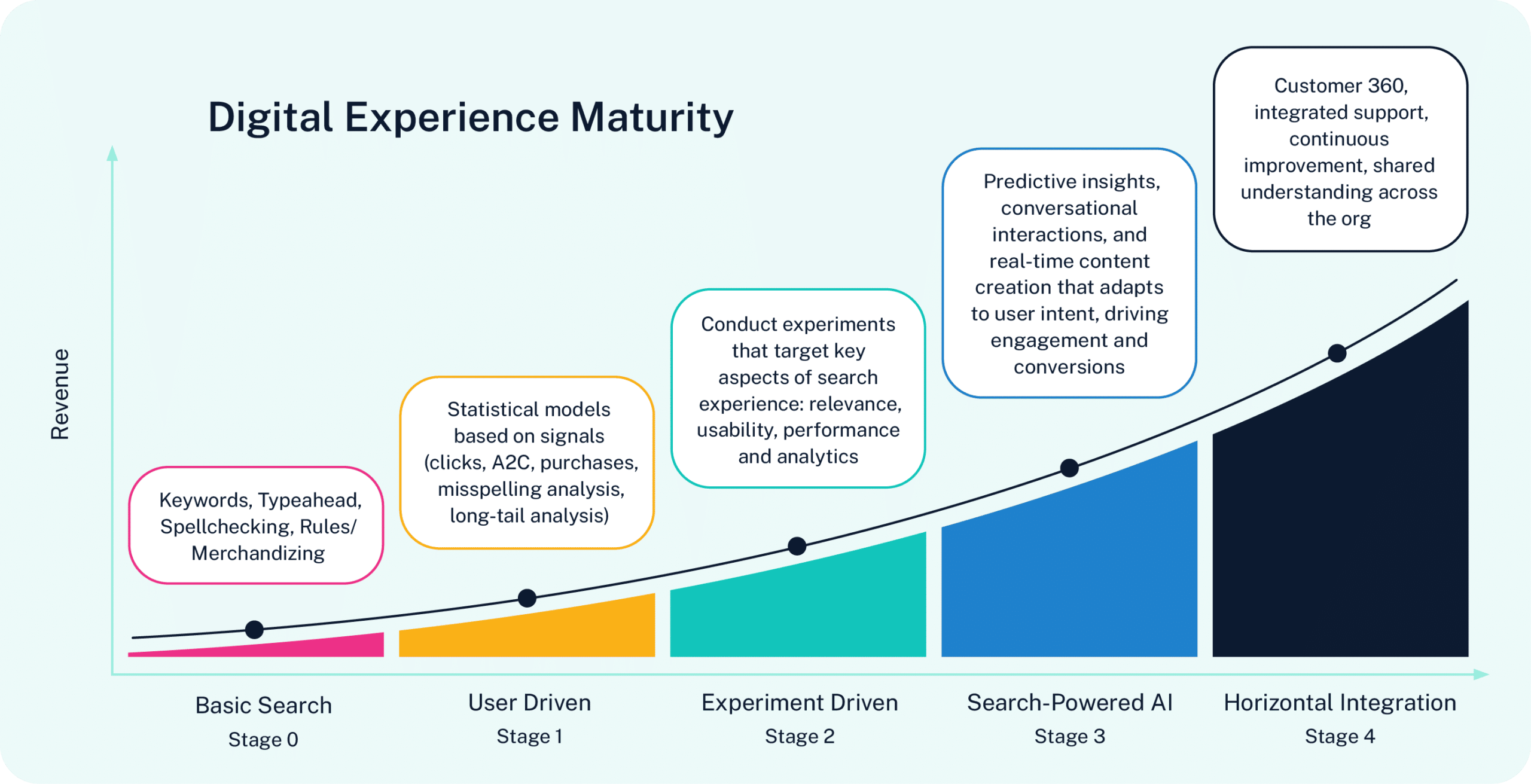
How to improve B2B search: AI strategies for manufacturing success
Let’s get real: Your website’s search function is likely costing you serious money. The Baymard Institute found that 31% of searches end in frustration, sending potential customers away—probably directly to your competitors. It’s clearly time to improve your B2B search strategy while optimizing your entire B2B e-commerce experience.
In this post, we’ll cover best practices for fixing your B2B search before it kills your sales.
The real costs of ineffective B2B search
Bad search = bad experience = bad business. When potential buyers can’t find the products they need (and quickly – like within a few seconds) with your enterprise search platform, they will likely leave your site. Then they’ll do one of three things:
- They’ll go to Google to try to find your product or service. If they find what they’re looking for on Google and it brings them back to your site, it’s not a total missed opportunity. But it’s not a great look.
- They’ll email your company or pick up the phone and call your customer service representatives. Just to ask questions about a product. That they should have found the information about on your website. So they can make an informed decision and speed up the sales cycle.
- They’ll go straight to your competitor. Where they can find exactly what they’re looking for. Because your competitor understands what your buyers want, serves them that information. Now that hurts.
Sure, maybe if one of those situations were to happen to your customer once, no biggie. If it’s happening to them every time, that’s a huge red flag. And guess what? It is happening more and more because B2B buyers don’t just come to browse – they already know exactly what they’re looking for and are expecting your website to deliver, creating significant challenges for B2B customer experience management.
Did you know? 77% of B2B buyers prefer to do their own research before speaking with sales.
The triple threat to your bottom line
Poor search functionality creates a triple threat to manufacturing businesses:
Lost sales and revenue: When users abandon their search efforts due to irrelevant results, it directly impacts your conversion rates. For manufacturing businesses dealing in high-value, high-quantity purchases, each lost opportunity represents significant revenue. A study by Baymard Institute, 31% of searches that don’t return relevant results lead to users abandoning their search efforts.
Customer satisfaction and retention: The modern B2B buyer expects the same seamless digital experience they get from consumer websites. When your search platform falls short, so does customer loyalty. Research shows that 68% of B2B buyers say they’d purchase more from vendors that personalize their online experience, with search functionality being a critical component of effective B2B customer experience management.
Operational efficiency: When users can’t find information through your search function, they inevitably reach out to your support teams. This creates a cascade of additional costs – from increased staffing requirements to longer sales cycles. According to a recent McKinsey report, companies that effectively implement digital self-service tools reduce their customer support costs by up to 40% while simultaneously improving response times.
The combined impact of these three factors makes search optimization one of the highest-ROI investments for manufacturing businesses looking to improve their digital presence.
Best practices for how to improve B2B search with AI
You might be thinking, ‘AI sounds great, but is it really ready for B2B?’ The answer is a resounding yes. AI-powered search for manufacturers has already proven to enhance search in many ways. And with the latest advancements in AI, like Neural Hybrid Search and generative AI, the future of AI-powered B2B sales enablement through improved search is incredibly promising.
Let’s explore four key capabilities that deliver immediate impact:
Personalized recommendations
Just like Netflix, AI can significantly improve B2B search by tailoring product suggestions based on user behavior and preferences. By analyzing past interactions, browsing patterns, and purchase history, AI algorithms can predict what products a user might be interested in and display personalized recommendations. This level of personalization not only improves the user experience but also helps improve B2B search conversion rate. Users are more likely to engage with and purchase products that are relevant to their needs and interests, creating a powerful B2B lead generation with AI opportunity.
Faceted navigation
Faceted navigation is essential for an effective B2B search software solution, allowing users to filter search box results based on various attributes such as product type, price, and specifications. This method simplifies the search process and helps users quickly narrow down their options. Effective faceted search implementations ensure that users can easily find the exact products they need without sifting through irrelevant results. For instance, robust faceted navigation features enable users to manage complex catalogs effortlessly. This not only enhances the user experience but also accelerates the path to purchase, leading to increased sales and customer satisfaction.
Intelligent autocomplete
Intelligent autocomplete is another best practice that enhances search functionality. By providing predictive text and relevant suggestions as users type their search queries, intelligent autocomplete reduces search time and effort. This feature helps users quickly find what they are looking for, even if they are unsure of the exact product name or spelling. The reduction in search time and effort leads to higher user satisfaction and a better overall experience.

Natural language processing (NLP)
In a nutshell, Natural Language Processing (NLP) is the technology that understands and interprets user queries accurately. NLP allows search engines to recognize synonyms, spelling errors, and natural language variations. That way, site visitors receive relevant results even if their search terms are not precise. For example, if a user searches for “high-speed drill,” NLP can understand that “fast drill” or “quick drill” are synonymous terms and provide relevant results accordingly. This capability enhances the accuracy of search results, reducing frustration and improving the overall user experience.
When one big box retailer implemented AI search, they experienced a 91% reduction in “zero results” searches, ensuring customers could find products regardless of how they phrased their queries.
Neural Hybrid Search: The next evolution in B2B search technology
Modern manufacturing catalog search solutions need more than just basic keyword matching. Hybrid search represents the convergence of multiple AI approaches to deliver superior results:
- Traditional keyword-based search for precise matching
- Semantic vector search for understanding context and meaning
- Machine learning algorithms for continuous improvement
- Natural language processing for understanding user intent
When implemented in your B2B search platform for manufacturers, hybrid search can dramatically improve search accuracy and user satisfaction. It’s particularly effective for complex product catalogs where traditional search might miss important contextual connections.
You can get Neural Hybrid Search up and running in weeks with our B2B Core Package or B2C Core Package.
The search maturity journey: A strategic path to B2B search excellence
Improving your B2B search isn’t a one-time upgrade—it’s a strategic progression. Our framework helps manufacturing companies assess their current capabilities and implement increasingly sophisticated solutions to meet evolving buyer needs and drive effective B2B e-commerce optimization.

From basic to brilliant: The 4 stages of search evolution
Step 1: Multi-source keyword search
This foundational capability connects users with information across your digital ecosystem. When an engineer searches for “industrial pump bearings,” they’ll see results from:
- Product catalogs with detailed specifications
- Technical documentation with installation guidelines
- Support information with maintenance recommendations
- Training materials with proper usage techniques
While this integration helps break down information silos, it relies heavily on exact keyword matches, which can miss important contextual connections. According to our research, about 60% of manufacturing companies currently operate at this level.
Step 2: Semantic vector search
At this stage, AI begins understanding the meaning behind search queries. When someone searches for “sealed bearings for chemical processing,” the system comprehends that:
- Chemical processing environments require specific material properties
- Corrosion resistance is likely a priority requirement
- “Sealed,” “shielded,” and “protected” may be related concepts
This semantic understanding improves search accuracy by 40-60% compared to keyword-only approaches, though it may still miss some relevant results that use entirely different terminology.
Step 3: Neural Hybrid Search & Stage 4: Generative AI—The comprehensive solution
The most advanced search capabilities combine neural hybrid search with generative AI to create a truly intelligent system. Consider these real-world applications:
**For technical product discovery:
An engineer searching for specialized components no longer needs to know exact terminology. The system understands user intent, technical requirements, and product compatibility, blending precise specification matching with contextual understanding.
**For complex problem-solving:
When a maintenance manager searches for solutions to equipment issues, the system moves beyond simple document retrieval. It synthesizes information from technical manuals, case studies, and user experiences to provide comprehensive guidance.
**For procurement efficiency:
Purchasing agents receive not just product listings but contextually relevant comparisons, compatibility information, and ordering guidance, significantly reducing the procurement cycle.
The implementation of these advanced capabilities has delivered transformative results:
- 65% reduction in search time for technical users
- 45% increase in first-time correct product selection
- 38% decrease in product returns due to incorrect specifications
Lucidworks integrates these technologies with robust safeguards that ground all responses in your actual product data, preventing the “hallucinations” that plague many generative AI implementations. Our AI guardrails ensure every recommendation is backed by your verified product information.
Enterprise scalability: Supporting global manufacturing operations
The Lucidworks Platform scales to meet the needs of global manufacturing businesses with complex product ecosystems:
- Catalog complexity management: Supporting millions of SKUs across multiple product lines with sophisticated attribute relationships
- Multi-language support: Delivering consistent search quality across 60+ languages for truly global operations
- Regional customization: Tailoring search experiences to account for regional product availability, pricing, and compliance requirements
- Omnichannel consistency: Ensuring unified search experiences across web, mobile, internal systems, and partner portals
Case study: Lenovo transforms global search with AI
Challenge and solution
Lenovo faced significant challenges supporting their diverse global customer base across 180 markets and 60 different languages. Their previous search solution couldn’t handle:
- The scale and complexity of their product catalog
- Regional variations in product availability and naming
- The technical nature of customer queries
- Consistent performance across dozens of languages
After an 18-month RFP process, Lenovo chose Lucidworks for its advanced AI-powered enterprise search capabilities and vision for future enhancements in machine learning.
Measurable business impact
The implementation of Lucidworks delivered quantifiable improvements in key business metrics:
- 95% increase in annual revenue contribution from search in the first year
- 55% improvement in search relevancy ratings
These results demonstrate how AI-powered search transforms from a utility feature into a strategic business driver, directly contributing to revenue growth and customer satisfaction.

Improve your B2B search today
The hidden costs of poor search functionality in B2B manufacturing are substantial, but the opportunity for transformation is equally significant. By implementing AI-powered search solutions, manufacturers can:
- Turn casual browsers into confident buyers
- Convert technical specifications into compelling product recommendations
- Transform complex catalogs into intuitive shopping experiences
- Leverage customer interactions for continuous B2B data-driven decision making
The competitive advantage of superior B2B e-commerce optimization through advanced search is clear—companies that invest in these capabilities are capturing market share and building stronger customer relationships while reducing operational costs.
To begin your search transformation journey, download our Manufacturer’s Guide to 2X More Relevant Search with AI.